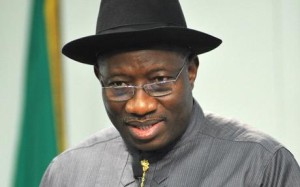Finance
Nigeria extends 2014 capital budget execution till March 2015

ABUJA-THE Federal Government of Nigeria
has extended the execution of the capital components of the 2014 budget by three months from the initial end date of December 31, 2014 to the last day of March 2015.
Our correspondent learnt from the Budget Office of the Federation in Abuja on Monday that the extension became imperative owing to the late passage of the fiscal document by the National Assembly.
The Senate had on April 9, 2014 passed the budget, raising the amount in the fiscal document from the N4.642tn submitted by President Goodluck Jonathan to the National Assembly on December 19, 2013 to N4.695tn.
Highlights of the 2014 budget as passed by the legislature and signed by Jonathan are statutory transfers, N408.68bn; debt servicing, N712bn; recurrent expenditure, N2.454tn; capital expenditure, N1.119tn; and aggregate expenditure, N4.695tn.
The lawmakers had tinkered with the original budget proposal, raising the recurrent expenditure from the original N2.43tn submitted by the executive to N2.454tn.
The National Assembly also raised the capital expenditure to N1.119tn from the original N1.10tn earlier proposed. The budget was signed by Jonathan on May 21 this year.
It was learnt that since the budget was passed almost in the middle of the year, it would be difficult for the capital components to be fully implemented within a six-month period.
A top official in the budget office, who spoke with our correspondent on the condition of anonymity as he was not officially permitted to speak on the matter, said since the process of awarding contracts was cumbersome, it would only be reasonable to grant the extension of the budget implementation cycle in the light of the late passage of the budget.
The official also said that the difficulties being encountered in the government’s quest to raise revenue owing to the massive drop in oil prices since June might have affected the release of funds.
The official said, “You know that the budget was passed almost in the middle of the year and before that time, nothing tangible was happening as regards capital spending. For instance, we had the first capital vote released almost in March; this is rather late considering the fact that such allocation should have come at the beginning of the year.
“Even as we speak, the fourth quarter capital allocation has not been released to the Ministries, Departments and Agencies of government. What we have so far released is just for three quarters and we can’t be closing the books when the fourth quarter allocation is still pending.
“So, all these are factors that affect budget execution and it is because of these that we have, as was done in the past, agreed to move the deadline for capital vote implementation to March ending.”
Findings further revealed that out of the N1.1tn budgeted for capital expenditure in 2014, only N610bn had been released to the MDAs two days to the end of the year.
The Director-General, Budget Office of the Federation, Dr. Bright Okogu, confirmed the figure in his review of the performance of the 2014 budget.
He said, “For the 2014 budget implementation, recurrent releases are on track. For capital, N610bn has been released, most of which has been fully cash-backed and being utilised.
“This level of implementation is coming amidst various challenges to the 2014 budget.”
Okogu listed some of the challenges facing the economy in terms of revenue generation to include quantity shocks (average oil production of 2.2 million barrels per day as against 2.38mbpd budgeted); price shocks (oil price falling from about $114 per barrel in June to about $60 presently).
The director-general also said that under remittance of Internally Generated Revenue by some MDAs was affecting the raising of the revenue needed to execute the budget.
According to figures obtained from the Ministry of Finance, a total amount of N4.03tn was collected as gross federally collected revenue in the first six months of this year.
The amount was generated from two major revenue sources. They are mineral revenue made up of crude oil sales, oil and gas royalties, rent, gas flared penalty, petroleum profit tax and gas tax; and non-mineral revenue such as Value Added Tax, corporate taxes, Customs import, excise and fees.
PUNCH-
Business
Nigeria pays US$4.9 billion on petrol subsidy in 2024- NNPCL
It was however noted by Biztellers.com.ng, that although subsidy is back in effect, the main reason for that is the increasingly weak state of the Naira and the country’s extreme dependence on products importation. Also unlike the previous subsidy era, where several oil marketers were getting free subsidy refunds for unverified product importation, this subsidy era is witnessing only one importer, the NNPCL, which in effect is the sole receiver of government subsidies.
Yemie ADEOYE
INSPITE of the official position of the Nigerian government that the controversial petrol subsidy is gone for good as announced by the President on assumption of office, the state owned Nigerian National Petroleum Corporation Limited, NNPCL has disclosed that petrol subsidy is still fully operational in Nigeria, although, under a different identity.
Umar Ajiya, Chief Financial Officer at the NNPCL, disclosed that it cost the company a staggering N7.8 trillion (US$4.9) to cover this price gap in the first seven months of 2024.
Rather than simply referring to these claims as subsidies, he stated that the company is merely managing the price difference in petrol imports on behalf of the federation, stressing that this should not be misconstrued as a return to subsidy payments.
![]() This revelation has reignited discussions on whether the NNPC is indirectly offering subsidies, a concept typically defined as selling a product below its cost price.
This revelation has reignited discussions on whether the NNPC is indirectly offering subsidies, a concept typically defined as selling a product below its cost price.
Documents reviewed by Biztellers.com.ng showed that the term “subsidy” was used extensively in official correspondence between the NNPCL and the presidency, particularly in reference to the “shortfall.”
Recall that President Bola Tinubu reportedly approved NNPC’s request to utilize the 2023 final dividends due to the federation to offset these costs.
However, during a media briefing on Monday about the company’s 2023 audited financial statements, Ajiya refuted claims that the NNPC is involved in any subsidy scheme.
Ajiya further disclosed that the Nigerian government owes the NNPC N7.8 trillion ($4.9 billion) in subsidy-related debts for the period from January to July 2024.
In furtherance of his clarification to the News Agency of Nigeria (NAN), Ajiya insisted that no subsidy payments have been made to any marketer in the last nine years, citing the NNPC’s role as the sole importer of petrol under supply contracts.
He said, “In the last eight to nine years, NNPC Ltd. has not paid anyone a dime as a subsidy; no kobo has been disbursed by NNPC Ltd. in the name of subsidy. No marketer has received any payment from us for subsidy.”
“What has been happening is that we have been importing PMS, which has been landing at a specific cost price, and the government tells us to sell it at half price. So the difference between the landing price and that half price is a shortfall.
“And the deal is between the Federation and NNPC Ltd., to reconcile, sometimes they give us money, so there is no money exchanging hands with any marketer in the name of subsidy.”
Ajiya remained silent on how much of the $4.9 billion could have been remitted to the federation account if the NNPC had not been covering the “shortfall.”
It was however noted by Biztellers.com.ng, that although subsidy is back in effect, the main reason for that is the increasingly weak state of the Naira and the country’s extreme dependence on products importation. Also unlike the previous subsidy era, where several oil marketers were getting free subsidy refunds for unverified product importation, this subsidy era is witnessing only one importer, the NNPCL, which in effect is the sole receiver of government subsidies.
Banking
CBN Denies Currency Devaluation

The Central Bank of Nigeria (CBN) has refuted claims of devaluing the.
Earlier reports suggested that the CBN had devalued the Naira, lowering its exchange rate from N631 to the dollar, compared to the previous day’s rate of N461.60 at the Importers and Exporters (I&E) window.
However, the Central Bank of Nigeria (CBN) released a statement on Thursday through its Acting Head of Corporate Communications, Dr. Isa Abdulmumin, categorizing the report as false information.
In the statement titled ‘CBN Has Not Devalued The Naira’, he said the attention of the apex bank was drawn to the news report by an Abuja based newspaper edition of June 1, 2023, titled “CB Devalues Naira To 630/51”.
However, the CBN stated categorically that the news report was replete with outright FALSEHOODS and destabilizing innuendos, ‘reflecting potentially willful ignorance of the said medium as to the workings of the Nigerian Foreign Exchange Market.’
“For the avoidance of doubt, the exchange rate at the Investors’ & Exporters (I&E) window traded this morning (June 1, 2023) at N465/USS1 and has been stable around this rate for a while.
“The public is hereby advised to ignore the news report by Daily Trust in its entirety, as it is speculative and calculated at causing panic in the market,” the CBN spokesman added.
He, therefore, advised media practitioners to verify their facts from the Central Bank of Nigeria before publishing in order not to misinform the public.
Banking
BREAKING: CBN Increases Interest Rate By 0.5%

The interest rate in Nigeria has been raised to 18.5 percent, up by 0.5 percent, from 18 percent where it was pegged in March 2023.
The Central Banks of Nigeria’s (CBN) Monetary Policy Committee (MPC) resolved to this effect at its third meeting of 2023 in Abuja, on Wednesday.
Governor, CBN, Godwin Emefiele, made the disclosure in the communiqué of the MPC’s meeting, thereafter.
While engaging the media at the end of the two-day meeting, Emefiele, said the committee voted to keep the asymmetric corridor at +100 and -700 basis points around the MPR.
In the view of the MPC, rising inflation rate is traceable to the high energy cost and challenges around the supply chain, among others, which lie outside the corridors of the CBN.
Emefiele said, “The current trend in price development would continue to be monitored by the bank with greater collaboration with fiscal authority to address the drivers of inflation.”
Biztellers reports that the CBN had effected six consecutive interest rate increases, which has seen the rate move from 11.5 percent in March 2022 to 18.5 percent in May 2023.













